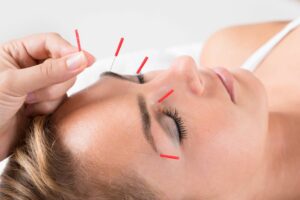For Menopause Awareness Month, Acupuncturist Katherine Berry reveals 4 proven reasons acupuncture could be an holistic alternative to HRT for Menopause
Menopause is associated with a wide range of uncomfortable physical and psychological symptoms.
Although menopause is a natural phenomenon, the years before and after the menopause can be associated with various symptoms, ranging from mild to severe.
According to the British Menopause Society, the average duration of symptoms is a shocking seven years!
Currently, the most common treatment is hormone replacement therapy (HRT). However, many women are reluctant to try HRT and are therefore seeking alternatives.
Since the menopausal transition is such personal journey, there is no ‘one-size-fits all’ solution. Tailored treatments such as those used in traditional Chinese and East Asian medicine (TCEAM) may provide benefits with, or instead of HRT.

Acupuncture is an excellent option and can also act as an effective complementary therapy for those already taking HRT or other medicines.
In fact, various studies have shown that acupuncture offers relief from some of the most common menopausal symptoms.
Katherine Berry(left), BHSc, MSc, is a renowned Australian acupuncturist, practitioner, educator with over 25 years of clinical experience based in Ibiza, Spain and author of Menopause: A Comprehensive Guide for Practitioners – available online from 18th October 2022
There are a few acupuncturists specialising in this field of women’s health. My new book helps to raise awareness for practitioners, ultimately aiming to ease the discomfort that millions of women suffer from each year.
Acupuncture for Menopause
Despite its far-reaching benefits, many women are unaware of precisely how acupuncture can ease the most common menopausal symptoms.
Acupuncture works by inserting fine needles into specific points in the body which switches on the part of the brain responsible for rest, relaxation, digestion and tissue healing: the parasympathetic nervous system.
Sometimes known as the rest and digest system, it balances out the ‘fight or flight’ response of the sympathetic nervous system. In short, acupuncture helps you to relax and kick-starts the body’s natural healing processes.
Acupuncture works by inserting fine needles into specific points in the body
In addition to performing an acupuncture treatment, a qualified Acupuncturist can offer tailored diet and lifestyle advice on a case-by-case basis, looking at the whole person – fulfilling the definition of ‘holistic therapy’.
READ MORE: 10 Perimenopause symptoms and how to deal with them naturally

Acupuncture versus HRT
The decision about whether to take HRT is a difficult one. There is so much conflicting information and side effects must be weighed up against the benefits.
Acupuncture, on the other hand, has a long history of being safe and effective. And acupuncture can be used with HRT, so menopausal women have more choices available to them now than ever before.
Women seeking acupuncture treatment should consult with a qualified Acupuncturist.
Reason #1 Acupuncture reduces hot flushes & night sweats
Hot flushes and night sweats (vasomotor symptoms or VMS), are among the most common symptoms menopausal women experience. They affect approximately 70 per cent of women in Western cultures.
VMS are also one of the best-studied areas of acupuncture for menopause. Studies found that acupuncture reduced hot flushes by 50 per cent for a period of six months.
A total 869 participants in 12 studies experienced a reduction in hot flush frequency and severity. It also found that acupuncture improved other menopause-related symptoms such as mood, general energy level, as well as overall quality of life.
READ MORE: 6 tips for supporting your digestive system through menopause

Reason #2 Acupuncture alleviates anxiety & depression
Because of fluctuating hormone levels, many menopausal women also suffer from mood disorders such as anxiety and depression.
Symptoms include shortness of breath, increase in heart rate, headaches, pain, problems sleeping and panic attacks. This is another area where acupuncture excels.
When the body is under stress, an area of the brain called the hypothalamus releases neurochemicals, and research shows that acupuncture can calm this response.
Acupuncture has also been shown to increase the release of endorphins, the body’s own ‘feel-good’ chemicals which play an important role in coping with stress, reducing pain and regulating digestion.
Reason #3 Acupuncture improves insomnia and sleeping problems
Women experience sleep differently from men, respond differently to sleep disorders, and are more likely to suffer from sleep deprivation. Hormonal changes throughout menopause can all have a significant impact on quality and duration of sleep.
In 2015 a review was carried out on 12 studies about acupuncture for sleep disorders in post-menopausal women. Overall, 75 per cent reported improvements in sleep complaints following acupuncture treatment.
READ MORE: 5 ways to ease anxiety during menopause

Reason #4 Acupuncture for osteoporosis
Weak bones that fracture or break easily are the result of a disease called ‘osteoporosis’.
The hormone oestrogen plays a crucial role in bone remodelling and because this decreases during menopause, women are more at risk of fractures, especially of the wrist, hip, and vertebrae.
Several large-scale reviews indicate that acupuncture helps increase bone mineral density (BMD).